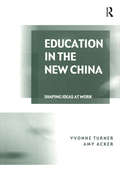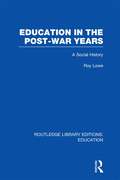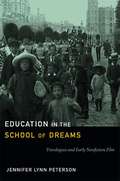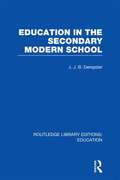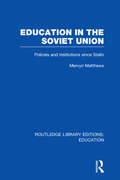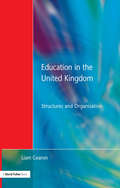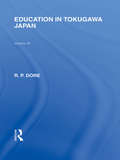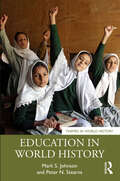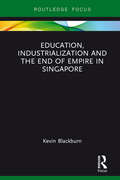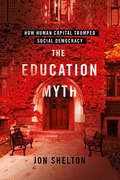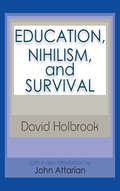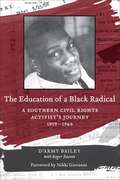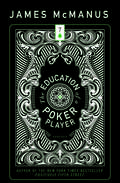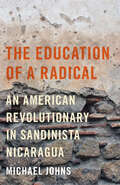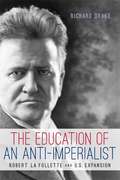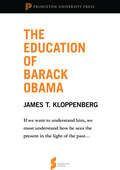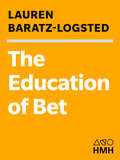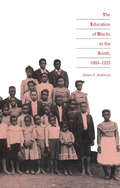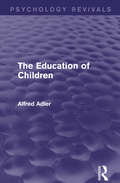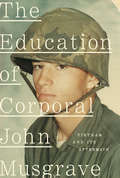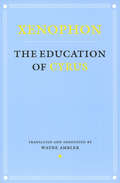- Table View
- List View
Education in the New China: Shaping Ideas at Work
by Yvonne Turner Amy AckerThe effects of the de-regulation of the Chinese university system have been nothing short of spectacular. For the first time since 1949, students possessing neither gifted intellect nor political connections have been able to share in the benefits of higher education, while a flood of international educators have opened up a previously cloistered and politically sensitized academic world. This fascinating book examines China’s higher education system, and how it’s new and unique blend of foreign and Chinese perspectives impact on both the lives of students and academics and wider Chinese society. Viewed with suspicion as a new type of Chinese by the older generation and by the government, they are at the same time the very entrepreneurs driving the economic and social revolution sweeping the country. Using a range of in-depth interviews and unique research, it provides open and often frank accounts of life, work and education in China, from the Cultural Revolution to the creation of its market-focused entrepreneurial generation. Candid and illuminating, this is a book no serious reader of Asian studies, comparative education or Asian sociology will want to be without.
Education in the Post-War Years: A Social History (Routledge Library Editions: Education)
by Roy LoweThis book provides an overview of the relationship between the sweeping social changes of the post-war period and education in England. It outlines the major demographic cultural and socio-economic developments which made new demands of the education service during the twenty years following the War and analyses the responses made by schools, colleges and universities. The book provides not only an informed narrative of the development of formal education, but also an authoritative account of the ways in which suburbanisation and the growth of the new property-owning middle class determined both the rhetoric of education and the structure of the system which emerged through the implementation of the 1944 Education Act.
Education in the School of Dreams: Travelogues and Early Nonfiction Film
by Peterson Jennifer LynnIn the earliest years of cinema, travelogues were a staple of variety film programs in commercial motion picture theaters. These short films, also known as "scenics," depicted tourist destinations and exotic landscapes otherwise inaccessible to most viewers. Scenics were so popular that they were briefly touted as the future of film. But despite their pervasiveness during the early twentieth century, travelogues have been overlooked by film historians and critics. In Education in the School of Dreams, Jennifer Lynn Peterson recovers this lost archive. Through innovative readings of travelogues and other nonfiction films exhibited in the United States between 1907 and 1915, she offers fresh insights into the aesthetic and commercial history of early cinema and provides a new perspective on the intersection of American culture, imperialism, and modernity in the nickelodeon era. Peterson describes the travelogue's characteristic form and style and demonstrates how imperialist ideologies were realized and reshaped through the moving image. She argues that although educational films were intended to legitimate filmgoing for middle-class audiences, travelogues were not simply vehicles for elite ideology. As a form of instructive entertainment, these technological moving landscapes were both formulaic and also wondrous and dreamlike. Considering issues of spectatorship and affect, Peterson argues that scenics produced and disrupted viewers' complacency about their own place in the world.
Education in the Secondary Modern School (Routledge Library Editions: Education)
by J JB DempsterThe articles which make up this book, originally published in the journal The Schoolmaster were originally published at the time of The Education Act 1944 which changed the education system for secondary schools in England and Wales. This Act made secondary education free for all pupils and introduced the tripartite system of education, of which secondary modern schools were one part. This volume examines issues of low self-esteem among pupils at secondary modern schools, academic versus practical curricula, assessment and challenges for teachers – issues which are still pertinent today.
Education in the Soviet Union: Policies and Institutions Since Stalin (Routledge Library Editions: Education)
by Mervyn MatthewsThis book provides a comprehensive survey of the successes and failures of education and training in the Khrushchev and Breshnev years. The author gives an objective assessment of the accessibility of the main types of institution, of the contents of courses and of Soviet attempts to marry the functioning of their education system to their perceived economic and social needs. In addition the book has many useful and original features: For ease of analysis it summarises in diagram form complex statistics which are not usually brought together for so long a time period. It provides a systematic account of educational legislation; Matthews’ comparison of series of official decrees will allow subtle shifts in government policy to be accurately charted. Particular attention is also paid to a number of issues that are often neglected: the employment problems of school and college graduates; the role and professional status of teachers; political control and militarisation in schools; the close detail of higher education curricula; and the rate of student failure. Of special value is the chapter on those educational institutions which are often omitted from Western studies and which are hardly recognised as such in most official Soviet sources.
Education in the United Kingdom: Structures and Organisation
by Liam GearonThis accessible book provides a basic understanding of the structure and organization of education in the United Kingdom in a time of rapid change and devolved government. It is designed as an introductory guide and reference work for all with an interest in education, including trainee and newly qualified teachers, university lecturers, school-based mentors, and governors and managers. It contains an accessible summary of key issues and contributions from some of the best-known writers in the field.
Education in Tokugawa Japan (Routledge Library Editions: Japan)
by Ronald DoreJapanese cultural life had reached a low ebb at the beginning of the Tokugawa period. The Japanese society which emerged when Tokugawa Ieyasu had completed the process of pacifying warring baronies was neither literary, nor hardly literate. The rulers were warriors and the people they ruled were largely illiterate. The Japan of 1868 was a very different society: practically every samurai was literate and it was a world in which books abounded. The transformation which had occurred in these two and a half centuries was an essential precondition for the success of the policy which the leaders of the Meiji Restoration were to adopt. An in-depth survey of the development and education during the period, this book remains one of the key analyses of the effects of Tokugawa educators and education on modern day Japan.
Education in World History (Themes in World History)
by Mark S. Johnson Peter N. StearnsEducation in World History shows how broad currents in transnational history have interacted with trends in educational organization and teaching practices over time. From antiquity and early classical societies to present day, this book highlights the ways in which changes in religious and intellectual life and economic patterns in key world regions have generated developments in education. Since the postclassical period, cross-cultural connections have also influenced educational change. In more recent times, transnational dialogues and mobility have played a vital role in shaping educational patterns. Ranging through South and East Asia, Africa, Europe and the Americas, the book also considers how the impact of modern forces, such as industrialization and nationalism, have transformed education in fundamental ways. Throughout the volume, Mark S. Johnson and Peter N. Stearns emphasize the tensions between elite and state educational interests and more diverse popular demands for access and, often, for more innovative pedagogy. Suitable for introductory world history and history of education courses, this lively overview reconsiders the history of education from the perspective of world and comparative history.
Education, Industrialization and the End of Empire in Singapore (Routledge Studies in Educational History and Development in Asia)
by Kevin BlackburnSingapore under the ruling People’s Action Party government has been categorized as a developmental state which has utilized education as an instrument of its economic policies and nation-building agenda. However, contrary to accepted assumptions, the use of education by the state to promote economic growth did not begin with the coming to power of the People’s Action Party in 1959. In Singapore, the colonial state had been using education to meet the demands of its colonial economy well before the rise of the post-independence developmental state. Education, Industrialization and the End of Empire in Singapore examines how the state’s use of education as an instrument of economic policy had its origins in the colonial economy and intensified during the process of decolonization. By covering this process the history of vocational and technical education and its relationship with the economy is traced from the colonial era through to decolonization and into the early postcolonial period.
The Education Myth: How Human Capital Trumped Social Democracy (Histories of American Education)
by Jon SheltonThe Education Myth questions the idea that education represents the best, if not the only, way for Americans to access economic opportunity. As Jon Shelton shows, linking education to economic well-being was not politically inevitable. In the eighteenth and nineteenth centuries, for instance, public education was championed as a way to help citizens learn how to participate in a democracy. By the 1930s, public education, along with union rights and social security, formed an important component of a broad-based fight for social democracy.Shelton demonstrates that beginning in the 1960s, the political power of the education myth choked off powerful social democratic alternatives like A. Philip Randolph and Bayard Rustin's Freedom Budget. The nation's political center was bereft of any realistic ideas to guarantee economic security and social dignity for the majority of Americans, particularly those without college degrees. Embraced first by Democrats like Lyndon Johnson, Jimmy Carter, and Bill Clinton, Republicans like George W. Bush also pushed the education myth. The result, over the past four decades, has been the emergence of a deeply inequitable economy and a drastically divided political system.
Education, Nihilism, and Survival
by Ernest KrauszUnder the influence of science, modern civilization has adopted the view that only things that can be verified empirically or arrived at rationally are true. Modern people tend to regard themselves as mechanisms, without any subjective aspects to their nature. In this insightful and passionately concerned book, British educationist and man of letters David Holbrook retorts persuasively that this reductive view of human nature is profoundly false. Man's inner, subjective life is essential to his nature, what happens to his consciousness is the most important thing in his life, and his greatest need is to find meaning.Holbrook also warns that reductionism has pernicious, even lethal, cultural, social, and political consequences. The logical result is nihilism: if human beings and existence are but physical mechanisms, it necessarily follows that consciousness does not exist, life is meaningless, our concern with moral values is pointless, and so are our lives and actions. Life itself reduces to nothing but self-indulgence and self-assertion. A culture informed by this perspective is necessarily full of expressions of hate and meaninglessness, which coarsens and demoralizes the majority of the population and worsens the mental pathologies of unstable persons. "Egoistical nihilism" becomes ever more widespread, and a decent society becomes impossible.Holbrook advances a keenly insightful and eloquent critique of the radical individualism of Max Stirner's famous tract The Ego and His Own. Stirner's worldview, he argues, is grounded in psychopathology and takes the nihilist assumptions of modernity to their logical conclusion: "the unique one" totally detached from society and reducing others to mere means to his ends, fair game for exploitation unfettered by ethical considerations. Ominously, he notes, the Stirnerean attitude toward existence is becoming increasingly common. Against the reductive perspective of positivism, Holbrook argues that scientific investigations establish the reality of meaning and of values rooted in love. He calls for a reaffirmation of both.Originally published in 1977, Education, Nihilism, and Survival speaks prophetically and even more urgently to us today. The worsening coarseness, nihilism, and brutality of our culture, the partisan fanaticisms and widespread alienation and apathy of our politics, and horrors such as school shootings reveal the consequences of radical individualism.Education, Nihilism, and Survival will be of interest to well-educated general readers concerned at the state of culture and society; educators alarmed at harmful approaches in education; and psychologists and philosophers concerned about existentialism, Stirner's egoist philosophy, and the need for meaningful, philosophical anthropology.
The Education of a Black Radical: A Southern Civil Rights Activist's Journey, 1959-1964
by Nikki Giovanni D’Army Bailey"A strong, uncompromising voice that dreams of a better America, Judge Bailey has experienced the ugliness of both racism and fear. Yet he has not stepped back. What a wonderful life to share." -- Nikki Giovanni, from her ForewordWhen four black college students refused to leave the whites-only lunch counter of a Greensboro, North Carolina, Woolworth's on February 1, 1960, they set off a wave of similar protests among black college students across the South. Memphis native D'Army Bailey, the freshman class president at Southern University -- the largest predominantly black college in the nation -- soon joined with his classmates in their own battle against segregation in Baton Rouge, Louisiana. In The Education of a Black Radical, Bailey details his experiences on the front lines of the black student movement of the early 1960s, providing a rare firsthand account of the early days of America's civil rights struggle and a shining example of one man's struggle to uphold the courageous principles of liberty, justice, and equality.A natural leader, Bailey delivered fiery speeches at civil rights rallies, railed against school officials' capitulation to segregation, joined a sit-in at the Greyhound bus station, and picketed against discriminatory hiring practices at numerous Baton Rouge businesses. On December 15, 1961, he marched at the head of two thousand Southern University students seven miles from campus to downtown Baton Rouge to support fellow students jailed for picketing. Baton Rouge police dispersed the peaceful crowd with dogs and tear gas and arrested many participants. After Bailey led a class boycott to protest the administration's efforts to quell the lingering unrest on campus, Southern University summarily expelled him.After his ejection, Bailey continued his academic journey north to Clark University in Worcester, Massachusetts, where liberal white students had established a scholarship for civil rights activists. Bailey sustained and expanded his activism in the North, and he provides invaluable eyewitness accounts of many major events from the civil rights era, including the protests in Washington D.C.'s financial district during the summer of 1963 and the gripping violence and arrests in Baltimore later that year. He sheds new light on the 1963 March on Washington by exploring the political forces that seized the march and changed its direction.Labeled "subversive" and a "black nationalist militant" by the FBI, Bailey crossed paths with many visionary activists. In riveting detail, Bailey recalls several days he spent hosting Malcolm X as a guest speaker at Clark, hanging out with Abbie Hoffman in the early days of the Worsester Student Movement, and personal interactions with other civil rights icons, including the Reverend Will D. Campbell, Anne Braden, James Meredith, Tom Hayden, and future congressmen Barney Frank, John Lewis, and Allard Lowenstein. D'Army Bailey gives voice to a generation of student foot soldiers in the civil rights movement. Moving, powerful, and intensely personal, The Education of a Black Radical offers an inspirational tale of hope and a courageous stand for social change. Moreover, it introduces an invigorating role model for a new generation of activists taking up the racial challenges of the twenty-first century.
The Education of a Christian Society: Humanism and the Reformation in Britain and the Netherlands (St Andrews Studies in Reformation History)
by N. Scott Amos Andrew PettegreeThroughout the sixteenth century, political and intellectual developments in Britain and The Netherlands were closely intertwined. At different times religious refugees from one or other country found a secure haven across the Channel, and a constant interchange of books, ideas and personnel underscored the affinity of lands which both made a painful progress towards Protestantism during the course of the century. This collection of ten new studies, all by specialists active in the field, explores the full ramifications of these links, from the first intellectual contacts inspired by the growth of Humanism to the planting of established Protestant churches. With contributions from specialists in art history, literary studies and history, the volume also underscores the vitality of new research in this field and points the way to several new departures in the field of Reformation and Renaissance studies.
The Education of a Navy: The Development of British Naval Strategic Thought 1867-1914
by D. M. Schurman(From the Book jacket) When iron and steam took the place of wood in 1859-60, the Royal Navy so immersed itself in the design of its new ships that the question of how the fleet should be used was almost overlooked. The strategy inherited from the past was considered irrelevant to modern needs. Fortunately, there were some naval men who insisted that the worth of a fleet is not measured solely by the quality of its individual units. Convinced that history had a more useful purpose than the mere recounting of heroic deeds, they showed that the technicians' wholesale dismissal of wooden-wall experience had been far too hasty. The Education of a Navy tells the story of six naval historians who, although not academics by training, took it upon themselves to extract from the archives evidence that the naval past could offer guiding principles for the present. Mr. Schurman ably summarizes the careers and writings of the Colomb brothers-Captain John who was concerned with the Navy's role in national policy, and Admiral Philip whose work made the study of naval history academically respectable; the American Admiral Alfred Thayer Mahan-author of the great Influence of Sea-Power upon History, 1660-1783-who helped make the Royal Navy an instrument of foreign policy; Sir John Laughton, founder of the Navy Records Society; Admiral Sir Herbert Richmond, a formidably able officer who, after retirement, made naval history more acceptable at Cambridge University; and Sir Julian Corbett, a writer with a completely non-military background and the author of the classic Some Principles of Maritime Strategy. About the author: DONALD MACKENZIE SCHURMAN received his doctorate from Cambridge University and is now associate professor of history at the Royal Military College, Kingston, Ontario.
The Education of a Poker Player
by James McManus"In writing about poker Jim McManus has managed to write about everything, and it's glorious."—David SedarisNew York Times-bestselling author James McManus offers up a collection of seven stories narrated by Vincent Killeen, an Irish Catholic altar boy, in the late 1950s and early 1960s. Persuaded at age eight by his grandmother that entering the priesthood will guarantee salvation for every member of his family, Vince eagerly commits to attending a Jesuit seminary for high school. As the meaning of a vow of celibacy becomes clearer to him, however, and he is exposed to the irresistible temptations of poker and girls, life as a seminarian begins to seem less appealing. These autobiographical stories are enlightening and evocative, providing keen, often humorous insight into Catholicism, faith, celibacy and its opposite, as well as America's—and increasingly the world's—favorite card game.James McManus has been called "poker's Shakespeare." He is the New York Times-bestselling author of Positively Fifth Street: Murderers, Cheetahs, and Binion's World Series of Poker and Cowboys Full: The Story of Poker, among others. He has been the poker columnist for the New York Times and currently writes the history column for CardPlayer. His work has also appeared in Harper's, The Believer, Paris Review, Esquire, and in Best American anthologies for poetry, sports writing, science and nature, and magazine writing. He has spoken about poker at Yale, Harvard, Google, Goldman Sachs, and on numerous media outlets, and is the recipient of the Peter Lisagor Award for Sports Journalism and fellowships from the Guggenheim and Rockefeller foundations, among other awards. He teaches at the School of the Art Institute of Chicago.
The Education of a Radical: An American Revolutionary in Sandinista Nicaragua
by Michael Johns“I went to Nicaragua with nothing but a tourist visa, $1,500 in cash, the name of someone at the Agrarian Reform Ministry, and the idea of being a revolutionary intellectual. . . . The idea took hold in a simple character flaw: wanting to believe that I knew better than everyone else.”—From the prefaceWhen Michael Johns joined a Sandinista militia in 1983, a fellow revolutionary dubbed him a rábano, a radish: red on the outside but white on the inside. Now, more than twenty-five years later, Johns appreciates the wisdom of that label as he revisits the questions of identity he tried to resolve by working with the Sandinistas at that point in his life. In The Education of a Radical, Johns recounts his immersion in Marxism and the Nicaraguan sojourn it led to, with a painful maturation process along the way. His conversion began in college, where he joined a student group called the Latin American Solidarity Association and traveled to Chiapas, Mexico, for research on his senior thesis. Overwhelmed by the poverty he witnessed (and fascinated by a new friend named Maricela who was trying to turn peasants into revolutionaries and who carried a heavily highlighted copy of Late Capitalism), he experienced an ideological transformation. When a Marxist professor later encouraged him to travel to Nicaragua, the real internal battle began for him, a battle that was intensified by the U.S. invasion of Grenada and its effect on the Sandinistas, who believed they were the next target for an imminent American invasion. Before he knew it, Johns was digging trenches and learning how to use an AK-47. His intellectual ideals came face-to-face with revolutionary facts, and the results would perplex him for years to come. Bringing to life a vivid portrait of the sometimes painful process of reconciling reality with romanticized principles, The Education of a Radical encapsulates a trove of truths about humanity, economics, and politics in one man’s memorable journey.
The Education of a Radical: An American Revolutionary in Sandinista Nicaragua
by Michael Johns&“An uncompromising look at his younger self and the Nicaraguan revolution . . . that compels readers to question their own motivations and beliefs.&” —The Americas When Michael Johns joined a Sandinista militia in 1983, a fellow revolutionary dubbed him a rábano, a radish: red on the outside but white on the inside. Now, more than twenty-five years later, Johns appreciates the wisdom of that label as he revisits the questions of identity he tried to resolve by working with the Sandinistas at that point in his life. In The Education of a Radical, Johns recounts his immersion in Marxism and the Nicaraguan sojourn it led to, with a painful maturation process along the way. His conversion began in college, where he joined a student group called the Latin American Solidarity Association and traveled to Chiapas, Mexico, for research on his senior thesis. Overwhelmed by the poverty he witnessed, he experienced an ideological transformation. When a Marxist professor later encouraged him to travel to Nicaragua, the real internal battle began for him, a battle that was intensified by the U.S. invasion of Grenada and its effect on the Sandinistas, who believed they were the next target for an imminent American invasion. Before he knew it, Johns was digging trenches and learning how to use an AK-47. His intellectual ideals came face-to-face with revolutionary facts, and the results would perplex him for years to come. Bringing to life a vivid portrait of the sometimes painful process of reconciling reality with romanticized principles, The Education of a Radical encapsulates a trove of truths about humanity, economics, and politics in one man&’s memorable journey.
The Education of an Anti-Imperialist
by Richard DrakeRobert M. La Follette (1855-1925), the Republican senator from Wisconsin, is best known as a key architect of American Progressivism and as a fiery advocate for liberal politics in the domestic sphere. But "Fighting Bob" did not immediately come to a progressive stance on foreign affairs. In "The Education of an Anti-Imperialist," Richard Drake follows La Follette's growth as a critic of America's wars and the policies that led to them. He began his political career with conventional Republican views of the era on foreign policy, avidly supporting the Spanish-American and Philippine-American Wars. La Follette's critique of empire emerged in 1910, during the first year of the Mexican Revolution, as he began to perceive a Washington-Wall Street alliance in the United States' dealings with Mexico. La Follette subsequently became Congress's foremost critic of Woodrow Wilson, fiercely opposing United States involvement in World War I. Denounced in the American press as the most dangerous man in the country, he became hated and vilified by many but beloved and admired by others. La Follette believed that financial imperialism and its necessary instrument, militarism, caused modern wars. He contended they were twin evils that would have ruinous consequences for the United States and its citizens in the twentieth century and beyond.
The Education of Barack Obama: From Reading Obama (Princeton Shorts #7)
by James T. KloppenbergIf you really want to know what makes Barack Obama tick, you need to understand his education. James T. Kloppenberg explains the rich American intellectual tradition that shapes Obama's beliefs and influences his actions--particularly his aversion to absolutes and his commitment to compromise. This look at Obama's education is a deeply rewarding education in itself. Princeton Shorts are brief selections taken from influential Princeton University Press books and produced exclusively in ebook format. Providing unmatched insight into important contemporary issues or timeless passages from classic works of the past, Princeton Shorts enable you to be an instant expert in a world where information is everywhere but quality is at a premium.
The Education of Bet
by Lauren Baratz-LogstedWhen Will and Bet were four, tragic circumstances brought them to the same house, to be raised by a wealthy gentleman as brother and sister. Now sixteen, they've both enjoyed a privileged upbringing thus far. But not all is well in their household. Because she's a girl, Bet's world is contained within the walls of their grand home, her education limited to the rudiments of reading, writing, arithmetic, and sewing. Will's world is much larger. He is allowed-forced, in his case-to go to school. Neither is happy. So Bet comes up with a plan and persuades Will to give it a try: They'll switch places. She'll go to school as Will. Will can live as he chooses. But once Bet gets to school, she soon realizes living as a boy is going to be much more difficult than she imagined.
The Education of Blacks in the South, 1860-1935
by James D. AndersonJames Anderson critically reinterprets the history of southern black education from Reconstruction to the Great Depression. By placing black schooling within a political, cultural, and economic context, he offers fresh insights into black commitment to education, the peculiar significance of Tuskegee Institute, and the conflicting goals of various philanthropic groups, among other matters. Initially, ex-slaves attempted to create an educational system that would support and extend their emancipation, but their children were pushed into a system of industrial education that presupposed black political and economic subordination. This conception of education and social order--supported by northern industrial philanthropists, some black educators, and most southern school officials--conflicted with the aspirations of ex-slaves and their descendants, resulting at the turn of the century in a bitter national debate over the purposes of black education. Because blacks lacked economic and political power, white elites were able to control the structure and content of black elementary, secondary, normal, and college education during the first third of the twentieth century. Nonetheless, blacks persisted in their struggle to develop an educational system in accordance with their own needs and desires.
The Education of Blacks in the South, 1860-1935
by James D. Andersoninterpretation of "the history of southern black education from Reconstruction to the Great Depression.
The Education of Children: Individual Psychology In The Schools And The Education Of Children: Education For Prevention (Psychology Revivals)
by Alfred AdlerOriginally published in 1930, this title looks at the education of children. Adler believes the problems from a psychological point of view are the same as for adults, that of self-knowledge and rational self-direction. However, the difference being that due to the ‘immaturity of children, the question of guidance – never wholly absent in the case of adults – takes on supreme importance.’ The title starts by presenting the Individual Psychology viewpoint as a whole, with the later chapters undertaking to tackle in more depth the various interrelated problems of children’s education.
The Education of Corporal John Musgrave: Vietnam and Its Aftermath
by John MusgraveA Marine's searing and intimate story—"A passionate, fascinating, and deeply humane memoir of both war and of the hard work of citizenship and healing in war&’s aftermath. A superb addition to our understanding of the Vietnam War, and of its lessons&” (Phil Klay, author of Redeployment).John Musgrave had a small-town midwestern childhood that embodied the idealized postwar America. Service, patriotism, faith, and civic pride were the values that guided his family and community, and like nearly all the boys he knew, Musgrave grew up looking forward to the day when he could enlist to serve his country as his father had done. There was no question in Musgrave&’s mind: He was going to join the legendary Marine Corps as soon as he was eligible. In February of 1966, at age seventeen, during his senior year in high school, and with the Vietnam War already raging, he walked down to the local recruiting station, signed up, and set off for three years that would permanently reshape his life.In this electrifying memoir, he renders his wartime experience with a powerful intimacy and immediacy: from the rude awakening of boot camp, to daily life in the Vietnam jungle, to a chest injury that very nearly killed him. Musgrave also vividly describes the difficulty of returning home to a society rife with antiwar sentiment, his own survivor's guilt, and the slow realization that he and his fellow veterans had been betrayed by the government they served. And he recounts how, ultimately, he found peace among his fellow veterans working to end the war. Musgrave writes honestly about his struggle to balance his deep love for the Marine Corps against his responsibility as a citizen to protect the very troops asked to protect America at all costs. Fiercely perceptive and candid, The Education of Corporal John Musgrave is one of the most powerful memoirs to emerge from the war.
The Education of Cyrus
by Xenophon Wayne AmblerXenophon's masterpiece, The Education of Cyrus, is a work that was admired by Machiavelli for its lessons on leadership. Also known as the Cyropaedia, this philosophical novel is loosely based on the accomplishments of Cyrus the Great, founder of the vast Persian Empire that later became the archrival of the Greeks in the classical age. It offers an extraordinary portrait of political ambition, talent, and their ultimate limits. The writings of Xenophon are increasingly recognized as important works of political philosophy. In The Education of Cyrus, Xenophon confronts the vexing problem of political instability by exploring the character and behavior of the ruler. Impressive though his successes are, however, Cyrus is also examined in the larger human context, in which love, honor, greed, revenge, folly, piety, and the search for wisdom all have important parts to play. Wayne Ambler's translation captures the charm and drama of the work while also achieving great accuracy. His introduction, annotations, and glossary help the reader to appreciate both the engaging story itself and the volume's contributions to philosophy.
